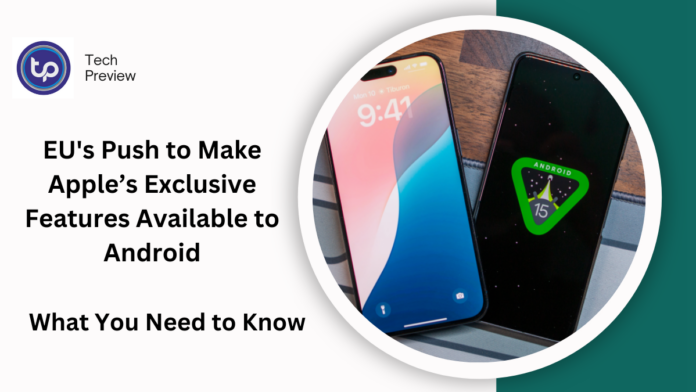The European Union is considering a bold move that could force Apple to open up some of its most exclusive features to Android users.
Under the Digital Markets Act (DMA), the EU is proposing that Apple allow other phone manufacturers to integrate its AirDrop, AirPlay, and other exclusive features into their devices.
These changes are aimed at increasing competition in the tech market and promoting a more open, interoperable digital ecosystem.
What’s at Stake for Apple and Android Users?
The EU’s proposals would mark a major shift in the smartphone industry, potentially giving Android users access to features that have long been exclusive to Apple devices. If the new rules go into effect, the following changes could take place:
Key Changes Under Consideration
- AirDrop and AirPlay Access for Android: One of the most significant proposals is for Android users to be able to use AirDrop, Apple’s file-sharing service, and AirPlay, the media streaming feature, on their devices.
- API Sharing: Apple may be required to share its Application Programming Interfaces (APIs) with third-party developers, enabling them to create apps and services that work seamlessly with Apple’s ecosystem.
- Expansion to Accessories: Apple’s exclusive features like automatic audio switching and notification systems could be made available to third-party accessories, making it easier for Android users to integrate with Apple’s wearables, such as the Apple Watch or AirPods.
MUST READ: AI-Powered Apple Features You Should Try on iPhone, iPad, and Mac
Why is the EU Pushing for These Changes?
The European Union has consistently argued that Apple’s dominant position in the smartphone market gives it an unfair competitive edge.
By keeping key features exclusive to its own devices, Apple is able to retain loyal customers who value the seamless integration between its hardware and software.
The EU believes that by making Apple’s technologies more accessible to Android devices, competition would increase, potentially lowering prices and fostering innovation in the market.
Key Points on the EU’s Motive
- Promoting Competition: The EU sees this as a way to break up the tight control Apple has over its ecosystem and encourage fairer competition.
- Better User Choice: The proposals could allow consumers more freedom in choosing their devices without feeling locked into Apple’s ecosystem.
- Tech Innovation: By allowing more players in the market to use Apple’s technology, the EU hopes to spur innovation across both iOS and Android devices.
Apple’s Response: Concerns Over Privacy and Security
Apple has responded cautiously to these proposals, arguing that opening up its APIs and exclusive features could put user privacy at risk.
The company has long been a strong advocate for user data protection, and it believes that sharing its APIs with third-party developers could expose sensitive user information to potential abuse.
Apple’s Concerns
- Privacy: Apple has been known for its strong stance on protecting user data, and sharing its technology could compromise its ability to maintain control over privacy.
- Security: Allowing third-party developers to access Apple’s features could create vulnerabilities that hackers might exploit.
The Potential Impact on Users
If the EU’s proposals are enacted, both Android and Apple users could see significant changes in how they interact with their devices. These changes could lead to greater convenience, but they may also come with some risks.
Benefits for Android Users
- Seamless File Sharing: Android users could finally use AirDrop to transfer files wirelessly between devices, a feature currently exclusive to iOS devices.
- Stream Media on Apple Devices: Android users could enjoy AirPlay to stream content to Apple TVs or other AirPlay-compatible devices.
- Better Integration with Apple Accessories: Users of Android phones could benefit from better integration with Apple’s accessories, like the AirPods, and enjoy features like automatic device switching.
Concerns for Apple Users
- Loss of Exclusive Features: Apple’s exclusive features, like AirDrop and AirPlay, have been a major selling point for iPhones and Macs. If these features are opened up to Android, it could reduce Apple’s uniqueness in the market.
- Privacy and Security Issues: Apple’s strong commitment to user privacy could be compromised if APIs are shared, as third-party apps could have access to sensitive data.
Conclusion
The European Union’s push to open up Apple’s exclusive features to Android devices is part of a broader effort to foster a more competitive and open digital market.
While this move could benefit Android users by giving them access to some of Apple’s best features, it raises significant concerns about privacy, security, and the potential loss of Apple’s competitive advantage.
Apple’s response suggests that the company is cautious about making such concessions, especially when it comes to user data and ecosystem integrity.
People May Ask
What is the Digital Markets Act (DMA)?
The DMA is a regulation introduced by the EU to curb the dominance of large tech companies, ensuring fair competition in the digital market.
Why is Apple concerned about these changes?
Apple fears that sharing its APIs could lead to privacy and security issues, as third-party developers could access sensitive user data.
How would Android users benefit from these changes?
- AirDrop: Android users could transfer files wirelessly with AirDrop.
- AirPlay: Android users could stream media to Apple devices like Apple TV.
- Better Accessory Integration: Android phones could integrate more smoothly with Apple’s accessories, such as the Apple Watch and AirPods.
Could this harm Apple’s business?
Yes, opening up its exclusive features could reduce the uniqueness of Apple’s devices, potentially affecting sales and customer loyalty.
How might this affect the future of smartphone technology?
The proposals could lead to greater interoperability between Android and Apple devices, fostering innovation and offering users more options for seamless integration between different brands and ecosystems.
Click here to learn more.








